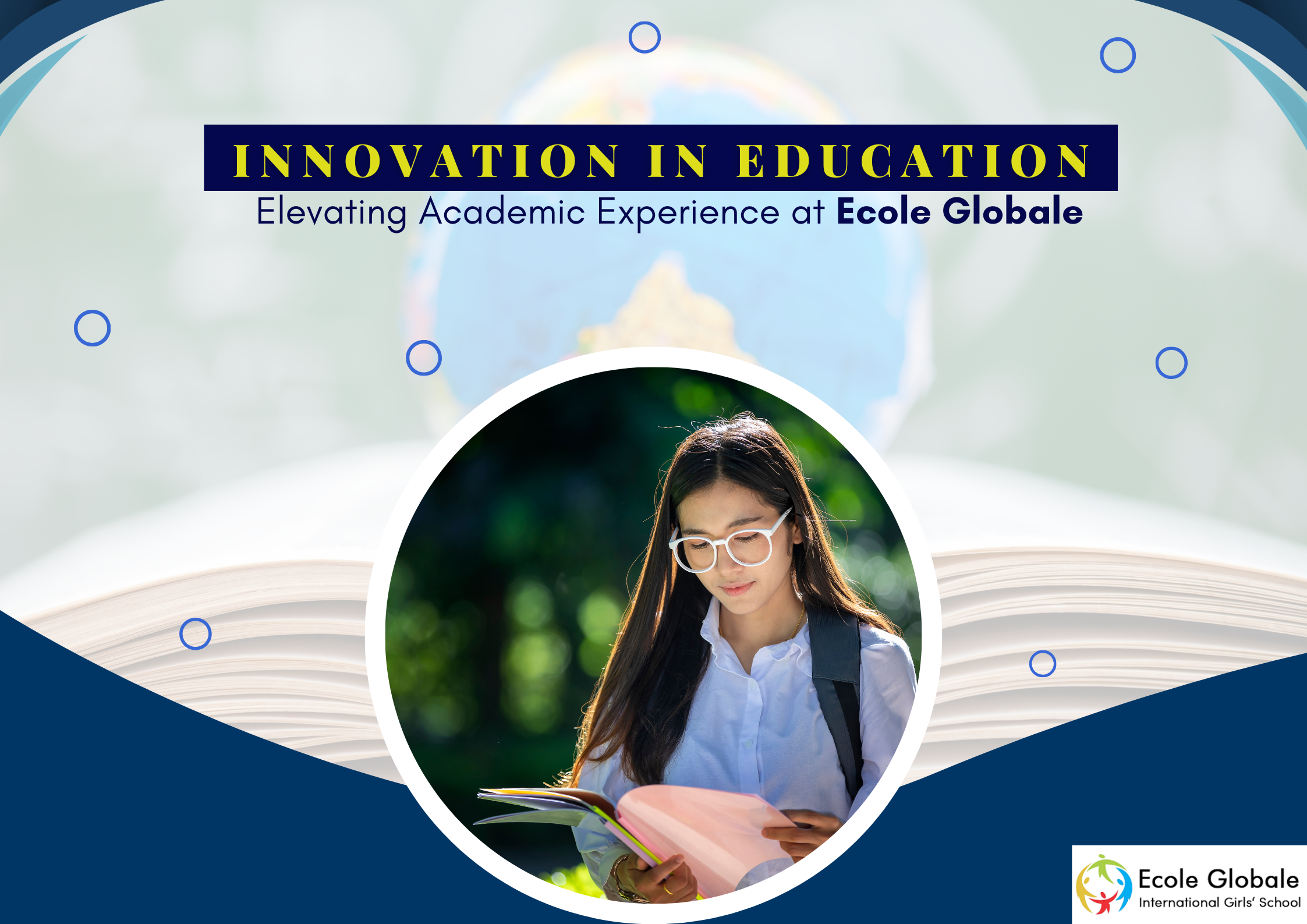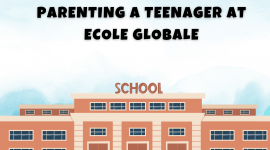Innovation in education is an ever-evolving landscape, especially in the context of international schools in North India. Among the institutions spearheading this movement is Ecole Globale, situated in the scenic city of Dehradun.
This article delves into the innovative practices at Ecole Globale and examines how other international schools in North India are embracing change to meet the dynamic needs of modern education.
Ecole Globale’s Innovative Curriculum:

Ecole Globale stands out for its innovation in education that goes beyond traditional boundaries. The school has adopted a global approach, integrating elements from diverse international educational systems.
The curriculum not only focuses on academic excellence but also emphasizes essential life skills and a comprehensive understanding of the world. Ecole Globale’s commitment to providing a well-rounded education positions it as a pioneer in innovation in education design.
Technological Integration:

In the era of digital transformation, technology plays a pivotal role in education that’s why innovation in education is important. Ecole Globale and other leading international schools in North India recognize the importance of technological integration in the learning process.
These schools leverage cutting-edge tools, online resources, and interactive platforms to enhance teaching methodologies and engage students in a tech-savvy learning environment.
Student-Centric Learning:

Schools with innovation in education prioritize student-centric learning models, moving away from traditional teacher-centric approaches.
Ecole Globale fosters an environment where students actively participate in their education, encouraging critical thinking, problem-solving, and collaborative learning.
This student-centric approach prepares students not just academically but also equips them with the skills necessary for the rapidly evolving 21st-century workforce due to innovation in education.
Experiential Learning Opportunities:

Ecole Globale and other international schools in North India are increasingly incorporating experiential learning opportunities into their curricula. Beyond textbooks, students engage in real-world experiences, field trips, internships, and hands-on projects.
These initiatives aimed by innovation in education to bridge the gap between theoretical knowledge and practical application, cultivating a deeper understanding of subjects and fostering a spirit of curiosity and exploration.
Multilingual Education:

Recognizing the importance of language in a globalized world, innovation in education with schools like Ecole Globale promote multilingual education.
Students are encouraged to learn and communicate in multiple languages, creating an environment where linguistic diversity is celebrated. This approach not only enhances language proficiency but also nurtures cultural sensitivity and effective cross-cultural communication skills.
Teacher Professional Development:

Innovation in education is not limited to students; it extends to the professional development of teachers. Ecole Globale invests in ongoing training programs and workshops for its educators, ensuring they stay abreast of the latest pedagogical trends and technologies.
This commitment to teacher professional development enhances the overall quality of education and contributes to a dynamic and adaptive learning environment.
Cultural Integration:

In international schools like Ecole Globale, cultural integration is a key component of innovation in education. The school actively fosters an environment where students from diverse cultural backgrounds come together.
Cultural exchange programs, celebrations of global festivals, and cross-cultural interactions contribute to a rich tapestry of experiences, preparing students to navigate a globally interconnected world.
Community Engagement and Social Impact:

Innovation in education in schools recognize the importance of community engagement and social impact. Ecole Globale, along with other leading institutions, encourages students to participate in community service projects, environmental initiatives, and social causes.
These experiences not only instill a sense of social responsibility but also provide students with a broader perspective on their role in society.
Challenges in Implementing Innovation:

While innovation in education is transforming education in North India, challenges persist. Limited infrastructure, varying levels of technological access, and the need for continuous teacher training are obstacles faced by schools like Ecole Globale.
Overcoming these challenges requires a concerted effort from educational stakeholders, policymakers, and the community to create an environment conducive to sustained innovation.
Future Trends in Educational Innovation:
Looking ahead, the future of innovation in education in North India appears promising. The integration of artificial intelligence, personalized learning pathways, and adaptive assessment tools are anticipated trends.
Ecole Globale and other institutions are poised to embrace these advancements, ensuring that students are well-prepared for the complexities of the digital age.
Conclusion:
Innovation in education is a dynamic force shaping the future of learning in North India. Ecole Globale, alongside other international schools, stands at the forefront of this movement, championing innovative curriculum design, technological integration, student-centric learning, and cultural diversity.
As these institutions continue to evolve, the educational landscape in North India is set to produce graduates equipped not only with academic excellence but also with the skills, adaptability, and global perspectives necessary for success in the 21st century.
Frequently Asked Questions (FAQs)
Ques 1. How does Ecole Globale’s innovative curriculum set it apart from traditional educational frameworks in North India ?
Ans. Ecole Globale’s innovative curriculum stands out by adopting a global approach and integrating elements from diverse international educational systems. Unlike traditional frameworks, the curriculum emphasizes not only academic excellence but also essential life skills and a comprehensive understanding of the world, positioning the school as a pioneer in innovative curriculum design in North India.
Ques 2. Can you elaborate on the role of technology in shaping the educational experience at Ecole Globale and other leading international schools in the region ?
Ans. Technology plays a pivotal role in education at Ecole Globale and other international schools in North India. These institutions leverage cutting-edge tools, online resources, and interactive platforms to enhance teaching methodologies, making learning more engaging. The integration of technology not only prepares students with essential digital literacy skills but also ensures they are well-equipped for the challenges of the 21st century.
Ques 3. How does Ecole Globale prioritize student-centric learning models, and what advantages does this approach offer in comparison to traditional teacher-centric methods ?
Ans. Ecole Globale fosters an environment that prioritizes student-centric learning models, moving away from traditional teacher-centric approaches. This approach encourages active student participation, critical thinking, problem-solving, and collaborative learning. By prioritizing student engagement, Ecole Globale prepares its students not only academically but also equips them with the skills necessary for success in the rapidly evolving 21st-century workforce.
Ques 4. In what ways do experiential learning opportunities, such as field trips and hands-on projects, contribute to the educational experience at Ecole Globale and other international schools in North India ?
Ans. Ecole Globale and other international schools increasingly incorporate experiential learning opportunities into their curricula. These experiences, including field trips, internships, and hands-on projects, bridge the gap between theoretical knowledge and practical application. Such initiatives cultivate a deeper understanding of subjects, fostering a spirit of curiosity and exploration among students.
Ques 5. How does Ecole Globale promote multilingual education, and what benefits does this approach bring to students in a globalized world ?
Ans. Ecole Globale actively promotes multilingual education by encouraging students to learn and communicate in multiple languages, including English, French, Spanish, Mandarin, and Hindi. This approach enhances language proficiency and nurtures cultural sensitivity and effective cross-cultural communication skills. In a globalized world, proficiency in multiple languages is considered an asset, preparing students to thrive in an interconnected world.
Ques 6. In the context of community engagement and social impact, how do innovative schools like Ecole Globale contribute to shaping students’ perspectives on social responsibility and their role in society ?
Ans. Innovative schools, including Ecole Globale, recognize the importance of community engagement and social impact. By encouraging students to participate in community service projects, environmental initiatives, and social causes, these schools instill a sense of social responsibility. These experiences provide students with a broader perspective on their role in society, fostering a commitment to making a positive impact and contributing to the betterment of the community and beyond.









